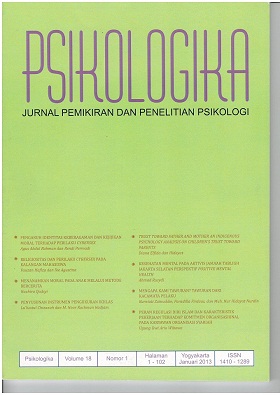Main Article Content
Abstract
This study aimed to determine the relationship between religiosity with cybersex behaviors in students. The hypothesis is There is a negative relationship between religiosity cyberesex behavior in undergraduate students. Someone religiosity is inversely proportional to his cybersex behavior. Subjects in this study are 52 people undergraduates student who lived in Yogyakarta . Data collection tool using scales that are Cybersex Behavior Scale and Religiosity Scale. The results of data analysis showed r = -0.333, with a significance level of 0008 (p <0.01). Based on the correlation results can be stated that there is a negative relationship between the religiosity of a cybersex behavior, so the hypothesis that there is a negative relationship between religiosity with cybersex behavior is acceptable. The coefficient of determination (R) obtained = 0.111 means that the contribution to the decline in religiosity variable rate of 11.1% CONDUCT cybersex.
Keywords: Religiosity, Cybersex
Article Details
Authors who publish with this journal agree to the following terms:
- Authors retain copyright and grant the journal right of first publication with the work simultaneously licensed under a Creative Commons Attribution-ShareAlike 4.0 International License that allows others to share the work with an acknowledgment of the work's authorship and initial publication in this journal.
- Authors are able to enter into separate, additional contractual arrangements for the non-exclusive distribution of the journal's published version of the work (e.g., post it to an institutional repository or publish it in a book), with an acknowledgment of its initial publication in this journal.
- Authors are permitted and encouraged to post their work online (e.g., in institutional repositories or on their website) prior to and during the submission process, as it can lead to productive exchanges, as well as earlier and greater citation of published work (See The Effect of Open Access).




